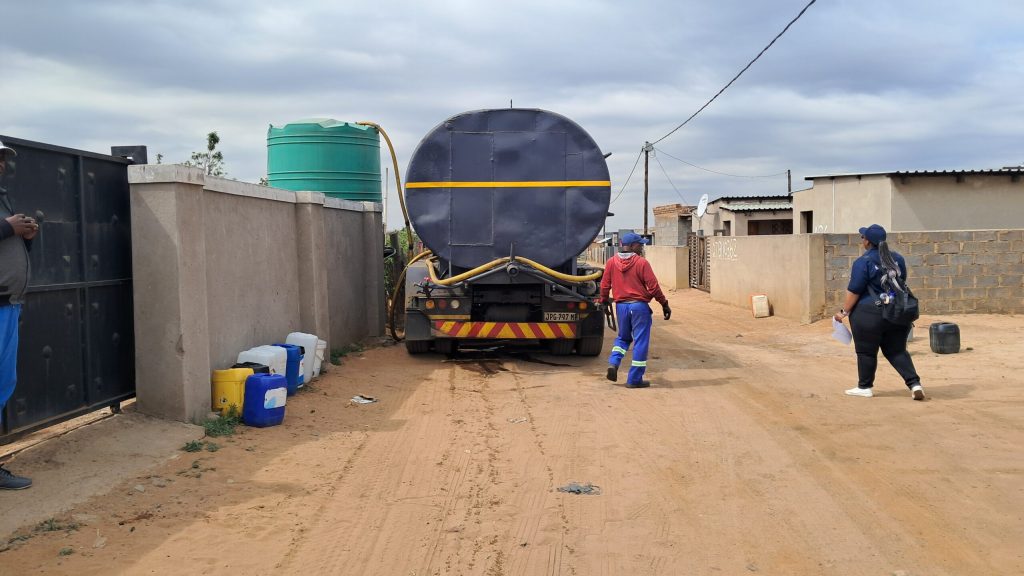Among the many informal settlements where Planact works are the fifteen settlements in Emalahleni Local Municipality (ELM) in Mpumalanga, where communities have long been concerned about water availability and their water quality.
In response, Planact undertook a social audit focusing on these twin sets of issues, determined to obtain a comprehensive picture of water provision. Social audits give expression to accountable and transparent governance processes where citizens are at the heart of the audit’s success. Planact’s social audit, focused on water, undertakes a two-fold examination with a study of government documents, including tenders and compares them to the lived and on-the-ground experiences of communities. Integral to this is the monitoring of government service delivery and expenditure.
In ELM, water trucking is the norm as there is no water supply to communities in this area. The goal of the social audit is to assess the water quality from the water source, typically reservoirs, boreholes, municipal water supplies, or storage tanks that is carried via tankers to households and community tanks and storage vessels and its effectiveness in achieving the humanitarian response, which is access to uncontaminated water and to assist in developing recommendations for improved water trucking implementation.
A survey tool was designed, and extensive surveying was conducted to obtain a community profile, determine household numbers and persons and their experiences with water provision. Regarding water availability, 400 out of 800 (50%) say water is delivered once a week. 100 respondents were unsure of water deliveries, and 100 said it was less than once a week. Responses indicated concerns with the overall water quality, with 319 of those surveyed affirming that the water is not clear, 240 were unsure, and only 226 suggested it was drinkable. There is a distinct problem with water quality in Emalahleni.
Water quality regularly gets media coverage and is becoming of increasing concern to the public. Planact’s project seeks to provide a credible and clear determination of the water quality being received by communities. This can only be achieved by laboratory testing. Test results will also provide the type of data-driven approaches that can inform policy responses, adherence to strict standards in the interests of public health, the upholding of human rights and promoting social justice.
Planact has teamed up with the University of Johannesburg’s Process Energy and Environmental Testing Station (PEETS) to further water analysis through robust testing protocols and to manage the laboratory process and result outcomes. Test results will be transparent and will be shared. Planact recognises that communities play a central role in driving change through self-organisation and engagement with local government. The organisation with communities undertakes activities that help transform settlements. A key focus of Planact’s work is to ensure that basic services are provided to deliver social justice and in support of human rights provisions and protocols.
Communities in Emalahleni will play a central role in driving water quality and access improvements, as awareness campaigns are envisaged, regular testing through testing kits and the sharing of water safety apparatus. Building local monitoring committees to ensure community involvement in water quality management will be part of the sustainability plan. These initiatives can set a precedent for other communities to learn from experiences in the Emalahleni municipality to strengthen water access and quality systems, advancing health and well-being for residents in informal settlements.
South Africa’s constitution states in Section 27(1)(b) that ‘Everyone has the right to have access to… sufficient…water.’ This section is enshrined under the Bill of Rights in Chapter 2 of the Constitution, providing socio-economic rights with a central significance in South Africa’s constitutional and democratic order. In 2010, the United Nations recognised that access to clean drinking water and sanitation was a human right. The UN declaration acknowledges the importance of ‘equitable access to safe and clean drinking water and sanitation as an integral component of the realization of all human rights. SDG 6.1 echoes this call for universal access for all. This underscores the fundamental role water plays in people’s lives and its centrality in ensuring health and well-being.
